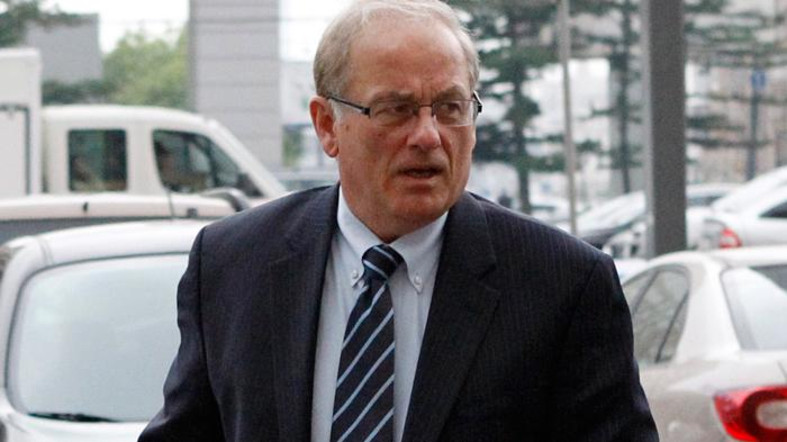Washington – Ambassador Frederic Hof, the director of Rafik Hariri Center for the Middle East-Atlantic Council and former U.S. Special Advisor on Transition in Syria, spoke with Asharq Al-Awsat newspaper about his expectations for the new U.S. administration’s policies in the Arab region.
Hof spoke in detail about the Syrian crisis and the possibility of the new administration resorting to military means to protect Syrian civilians and remove Bashar al-Assad from power.
He felt optimistic about the Mosul operation in Iraq to liberate it from ISIS control. He also advised the coming U.S. administration to fix what the current administration ruined in the relationship with the Middle East.
When asked about his evaluation of how the Obama administration dealt with the Syrian crisis, Ambassador Hof said Obama considered that a U.S. military intervention in Syria will make the situation worse.
Hof had a different opinion. He believed that the administration took several bad decisions when it could have prevented humanitarian crises from unfolding in Syria. He spoke of two mistakes that Obama made when he refused to arm the Free Syrian Army (FSA) and rejected to launch a military campaign against the Assad regime after chemical weapons were used in Eastern Ghouta.
The ambassador didn’t criticize the role Secretary of State John Kerry played in the Russian-U.S. agreement. He believed that Kerry did what he could to push Russia to cooperate.
According to Hoff, both Kerry and Obama realize that as long as civilians are the target of military operations, there won’t be a political operation in the country or serious negotiations over a political agreement.
The Russian intervention in Syria since September 2015 was for one purpose: to save Bashar al-Assad from military defeat.
The ambassador explained that the situation in Syria is very similar to that of Iraq. He said that a gap was created in eastern Syria due to the lost legitimacy of Assad just like the illegitimacy of Nouri al-Maliki’s government. He said that the void was filled by ISIS.
By assuming that Raqqa can be liberated and that ISIS can be defeated militarily in Syria, the problem won’t be solved unless Assad, his family and entourage leave the political scene.
When asked about how Hillary Clinton or Donald Trump would handle the situation, the ambassador explained that Hillary will ask the defense secretary and chief of staff to set real options for Syria that don’t include military intervention.
The only thing that worries Assad is having enough oil in the helicopters used for dropping explosive barrels on residential neighborhoods, he said.
He added that he believes that Clinton will take several steps to ensure the safety of the civilians and will be open for the idea of peaceful negotiations to solve the crisis.
As for Trump, Hof admitted there are many questions about his policy towards Syria. VP candidate Mike Pence stated that civilians should be protected. Yet, Trump suggested an initiative with Russian President Vladimir Putin and proposed that counter-terrorism in Syria should be left to Russia.
But, Hof is sure that if Trump won and studied the situation carefully in Syria, he would have a better idea than the notions he was promoting during his campaign.
The former advisor doesn’t expect any military action to remove Assad from power. He added that if U.S. wanted a modest military action to protect civilians, it will open the way for diplomatic and political solutions.
The ambassador said he can’t predict what the situation in Syria would be in the coming two or three years, but he is sure that if the U.S. didn’t interfere to protect the civilians, then nothing good would happen there.
When asked about his evaluation for the situation in Iraq and the Mosul liberation operation, the ambassador said that so far it is going well. He is sure that ISIS will be completely defeated in Mosul, but doesn’t know how long will it take. He revealed that plans are being studied currently for real combat within the city.
Hof also considered that the Obama administration learned from the 2003 occupation of Iraq, and had devised a plan for after the liberation of Mosul to ensure stability in the area. He also mentioned that Obama admitted that one of his regrets was not insisting on leading the operations in Libya.
Hof said that he doesn’t think the U.S. has devised a post-ISIS plan or to prevent the surfacing of other extremist groups like ISIS.
He added for a plan to be effective, it should from the district itself to prevent a vacant in ruling that could lead to ISIS-like organization from coming to rule. He said that Iraqi leaders should form a legitimate local government to prevent such organizations.
He reiterated that U.S. and other countries can help but the real change should come from within Iraq.
When asked about his vision for the type of relationship between the coming U.S. administration and the Middle East, Hof believes it depends on the new president’s decision on whether he or she want to stay or be involved in the region on solid bases.
If the answer is yes, then the next step should be to convince the U.S. public that remaining in the Middle East is important.
But, and according to Hof, Americans see the Middle East as a troublesome area. However, for him, the ambassador said that it is crucial to maintain a relation with the Middle East.
Hof believes that the Obama Administration failed in maintaining good relations with Saudi Arabia and worked on establishing new associations with Iran and Cuba.
He concluded that probably one of the most important jobs of the new president is to build and cherish relations with partners in the Middle East.
Hof said that reviving those relations is important for U.S. itself and is related to the country’s national security.
